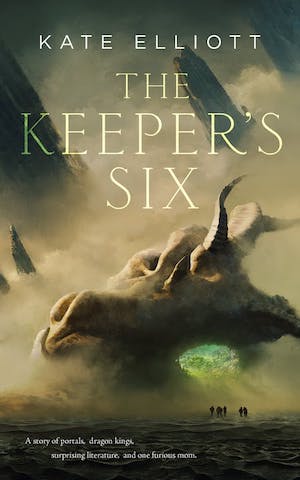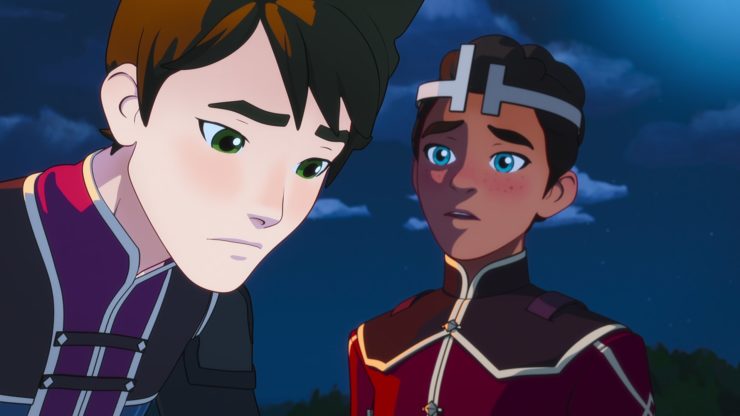It’s hard to believe that it’s been three years since the last season of The Dragon Prince was released. The pandemic has surely slowed down the world in a multitude of ways, and everyone deserves (and needs) time to get our feet, back under us, but it seems a bit cosmically out of whack when one of the best comfort-watches on television has to leave you hanging for a proverbial age.
[Spoilers for season 4 of The Dragon Prince.]
It seems only right to start with the difficult part. Given the amount of time that fans have had to wait, it’s rough to admit that the first half of The Dragon Prince’s fourth season is… kind of a mess.
The scripts are clunky and overwrought, missing the show’s usual sharpness when handling weightier themes, and dealing out plot elements that are far more heavy-handed than the norm. There’s very little time given to the core trio of Callum, Reyla, and Ezran, which is a shame because all three of them are two years older and in functionally different places in their lives. Some elements perhaps could have used another script pass on the editing side—the fight between a Sunfire Elf lighting a soul candle for their departed mother and the human architect of the elven camp who refuses to allow open flames has all the nuance and complexity of a sledgehammer. But this awkward handling steps up a notch when dealing with the eponymous figure of the season: Aaravos, the Startouch Elf who has been manipulating Viren (and now his daughter Claudia) to do his bidding, the one that our heroes must work to keep imprisoned at all costs.
In a staggeringly large infodump provided by Zubeia, the dragon queen, we learn that Aaravos the “fallen star” has been behind practically every war and period of unrest in Xadia’s history, using leaders like pawns and sowing discord between allies, friends, and families. He is given credit for every single atrocity that the disparate groups across their world have inflicted on each other, known for his cunning, his charm, and his ability to insinuate himself everywhere… but particularly into the minds of humans, who received their ability to use magic from his knowledge. It even turns out that Callum’s cube that he’s been using the detect various types of magic throughout his adventures is the Key of Aaravos, something that the elf created. Zubeia explains that in order to prevent his influence from flourishing, Aaravos was imprisoned somewhere secret, with only a mirror to look in on him.
So, a fallen star who tempts people into doing his dark bidding, and happens to be “responsible” for every terrible thing that’s ever happened in the history of their world. That… sure sounds like biblical Lucifer, doesn’t it?
This isn’t to suggest that the use of Christian imagery and mythology isn’t in step with what The Dragon Prince has built in the narrative sense—the show is primarily a reworking of European fantasy tropes, which means that Christianity is very much on the table in the parameters of such a reworking. But the question ultimately becomes: to what end? Because the initial infodump leaves much to be desired, particularly when you go around suggesting that one guy can be blamed for everything bad that all people have ever done in the entire history of the world.
Thankfully, the season picks up about halfway through, particularly in the last three episodes, bringing different vantage points and more complexity to the history we’re presented with. The main purveyor of the pro-Aaravos position is Claudia, who gets the chance to state her case when brother Soren has her tied up and insists that she’s chosen the wrong side. Claudia counters that humans had nothing before Aaravos gifted them with magic, that the other races of their world were perfectly happy to let humanity squabble amongst itself and die out until he rescued them from that fate.
This seems to suggest that magic is serving as the stand-in for knowledge (as in, eating the apple from the tree in Eden) in The Dragon Prince—it is the power humans should not possess, the manner by we we construct our own downfall, the one thing we were told we could not have and insisted upon messing with anyway. This particular reshuffle presents the story with plenty of philosophical avenues that have already been primed through their central characters; the suggestion in early seasons that humans could not use any form of magic but the dark kind, Callum’s ability to access these sources seemingly without the use of dark magic, Aaravos’ threats to their group and insistence that they’re all playing right into his hands, all of these elements can now be played toward a fascinating end if generalities are avoided going forward.
Other aspects of the season were handled more deftly than the wobbly introduction to Aaravos’ plot, particularly where queer relationships took focus: the new engagement of Sunfire Elf Queen Jenai and General Amaya is thoughtfully handled through the season, showing both characters working hard to build trust and learn from one another, while not pretending that the differences in their backgrounds are a simple issue that love easily overcomes on their behalf. Amaya has to rein in her own flippancy about cultural differences she’s unfamiliar with, as Jenai must continue to learn sign language in order to better communicate with her. The two have conversations about what they fear, what they want, where they see their lives heading in the midst of all the distrust and fear surrounding them. They are bolstered only by the fact that they want happiness and fulfillment for each other, no matter what path they choose. At no point is it ever suggested by either of them that their commitment to each other is any part of the problems they face, despite that being a commonly easy out in such situations.
Buy the Book


The Keeper’s Six
And the show manages to bring in allegorical strife here that will resonate with queer and marginalized viewers even though their fictional realm eschews homophobia and human-on-human racism—when they first become engaged, Jenai’s brother Karim tells his sister that her marriage to a human will weaken her position as queen and make her own people doubt her commitment to ruling. He suggests that she keep the relationship a secret to avoid this complication… a suggestion that many queer people have received from family members who believe that their choices are a burden on the rest of the world. The fact that this type prejudice is overlaid onto the burgeoning rift between Jenai and her brother is intentional because all of it is connected.
Then there’s Claudia’s new boyfriend, Terry (Terrestrius), an Earthblood Elf whose inherent sweetness irritates and perplexes her father Viren to no end. My spouse (who is of the trans-masc persuasion) pegged the character’s “trans boy energy” straight away, on account of being… extremely like him. Okay, he doesn’t have green hair, but he’s a nature-communing goof who used to wear crop binders, and refuses to take societal advice to toughen up—as Viren suggests to Terry—instead committing to feeling “all the feelings” as a guy. (Do his farts also smell like flowers? I leave that to your imagination.) So when Terry did eventually admit that he’d rejected his culture’s attempt to assign him the role of a “doe” instead of a “buck,” that was kind of a big deal in our household.
And the fact that Terry seems to be using an abundance of love to get through to Claudia in moments when she drifts too far into the darkness? That’s… that’s not meaningful to me at all.
So The Dragon Prince really pulls things off by the end of the fourth season, making me deeply eager to see what they’ve got in store for the next. Hopefully whatever hiccups were caused by the pandemic have muted a little, and we’ll be seeing Xadia again sooner rather than later.










